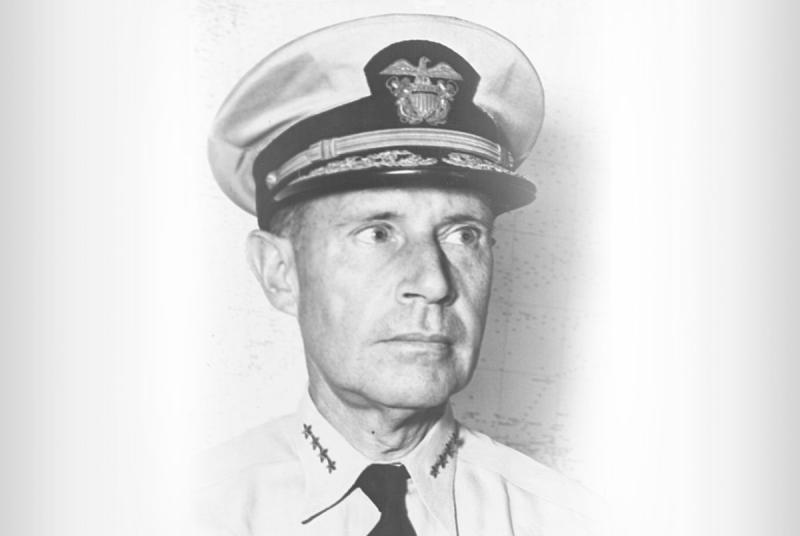Admiral Spruance - The Quiet Worrier
By: Ian Gargan (AMAC - The Association of Mature American Citizens)



Certain historical military figures emerge not only as strategic geniuses but also as unsung heroes whose stories deserve to be told. Admiral Raymond A. Spruance, a name not as widely recognized as some of his contemporaries, stands as a testament to quiet brilliance and unwavering courage. A man from humble beginnings grew to become a pivotal figure in US history.
A Humble Beginning
Raymond Ames Spruance was born into a middle-class family on July 3, 1886, in Baltimore, Maryland. From an early age, Admiral Spruance exhibited a keen intellect and a quiet determination that would become defining characteristics throughout his life.
After graduating from Shortridge High School in Indianapolis, he attended the U.S. Naval Academy. Admiral Spruance navigated the rigorous academic and physical challenges with a quiet resolve. His dedication earned him the respect of his peers and superiors alike. Little did anyone know that this unassuming young man would go on to play a pivotal role in some of the most significant naval battles in history.
The Pacific Theater: A Crucible of Fire
As World War II engulfed the world, Admiral Spruance found himself thrust into the heart of the Pacific Theater. His role in the Battle of Midway, a turning point in the war, would etch his name in the annals of military history. In June 1942, against overwhelming odds, Admiral Spruance led the U.S. Pacific Fleet to a decisive victory over the Imperial Japanese Navy.
To capitalize on the intelligence they had gathered after breaking the Japanese naval codes, the Admiral employed a clever ruse. The Navy sent a message from Midway that the desalinization facilities were not working. The Japanese sent the same message in code to their superiors, confirming to the US Navy that Midway was the target of the next attack. Knowing Midway was the target, the Navy prepared a strategic ambush to surprise the Japanese fleet. Paired with a devastating air strike from the carrier-based aircraft, the U.S. was able to sink all four Japanese carriers and shift the balance of the naval powers in the Pacific.
Admiral Spruance's ability to grasp the complexities of naval warfare and make split-second decisions set him apart. The Battle of Midway showcased his mastery of naval tactics as he outmaneuvered the enemy, leading to a resounding triumph that shifted the balance of power in the Pacific.
The Battle of Leyte Gulf: Navigating the Storm
Admiral Spruance's legacy continued to unfold during the Battle of Leyte Gulf, often regarded as the largest naval battle of World War II. This battle was a complex and multifaceted engagement, and as the commander of the U.S. Third Fleet, Admiral Spruance faced the daunting task of protecting the crucial landing at Leyte. While fending off the formidable Japanese fleet, he displayed a cool-headed resolve that inspired those under his command.
As the battle raged on, Admiral Spruance's fleet engaged the enemy in a series of fierce clashes. The Battle of Leyte Gulf witnessed the first widespread use of kamikaze attacks by the Japanese. These suicide attacks targeted allied ships, and Spruance's fleet had to endure numerous assaults. Admiral Spruance's leadership contributed to the eventual liberation of the Philippines and marked another chapter in his storied career as a naval commander.
Legacy of Leadership: Beyond the Battlefield
Admiral Raymond A. Spruance's contributions extended beyond the heat of battle. Known for his humility and reluctance to seek the limelight, he shied away from the public eye, preferring to let his actions speak louder than words. Post-war, he served as the President of the Naval War College, leaving an indelible mark on the education and training of future naval leaders.
Admiral Spruance's strategic vision and leadership qualities continue to be studied in military academies worldwide. His legacy serves as a beacon for those who believe that true heroism lies not in flamboyance but in quiet dedication, in the ability to make tough decisions when the world hangs in the balance.
In naval history and American history, Admiral Raymond A. Spruance stands as a paragon of leadership, a man who shaped the course of World War II with his brilliance and courage. His story reminds us that, even in the chaos of war, there exist individuals whose quiet determination and extraordinary actions change the course of history.
No personal insults
No death wishes of any individual
All of NT's rules apply
PS
Calling members "trolls" or ""dishonest" will result in your comment being deleted.

Who is online
31 visitors

